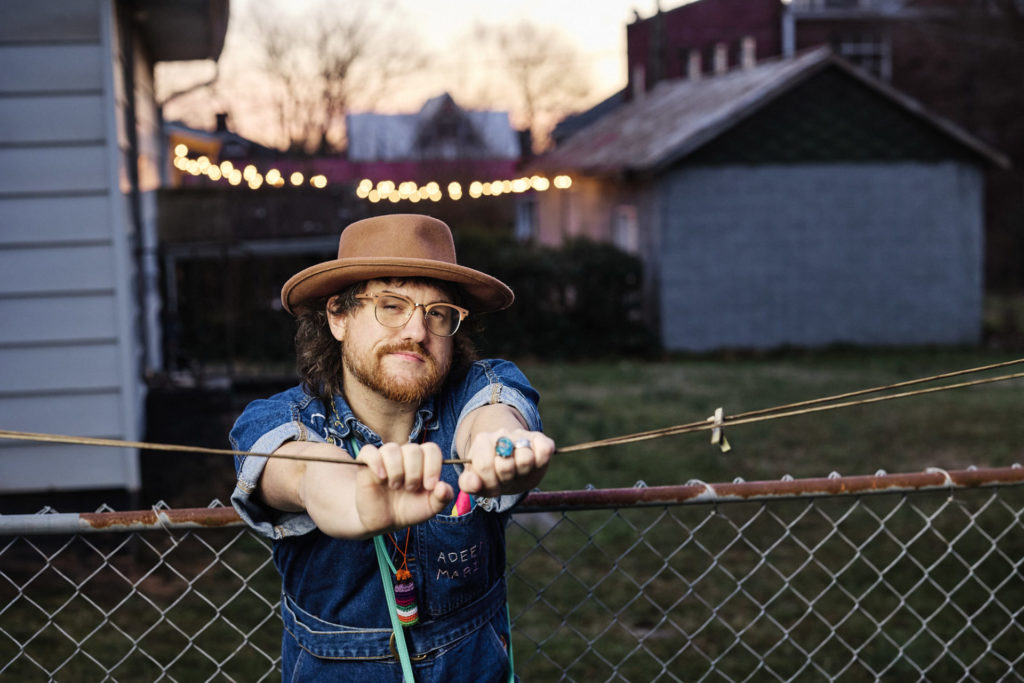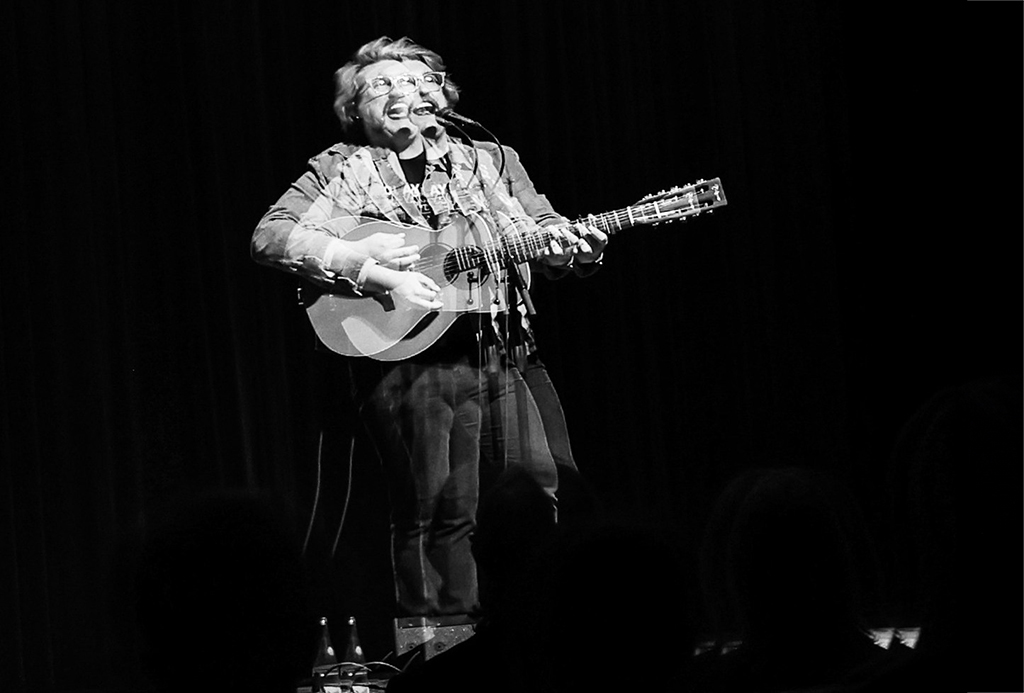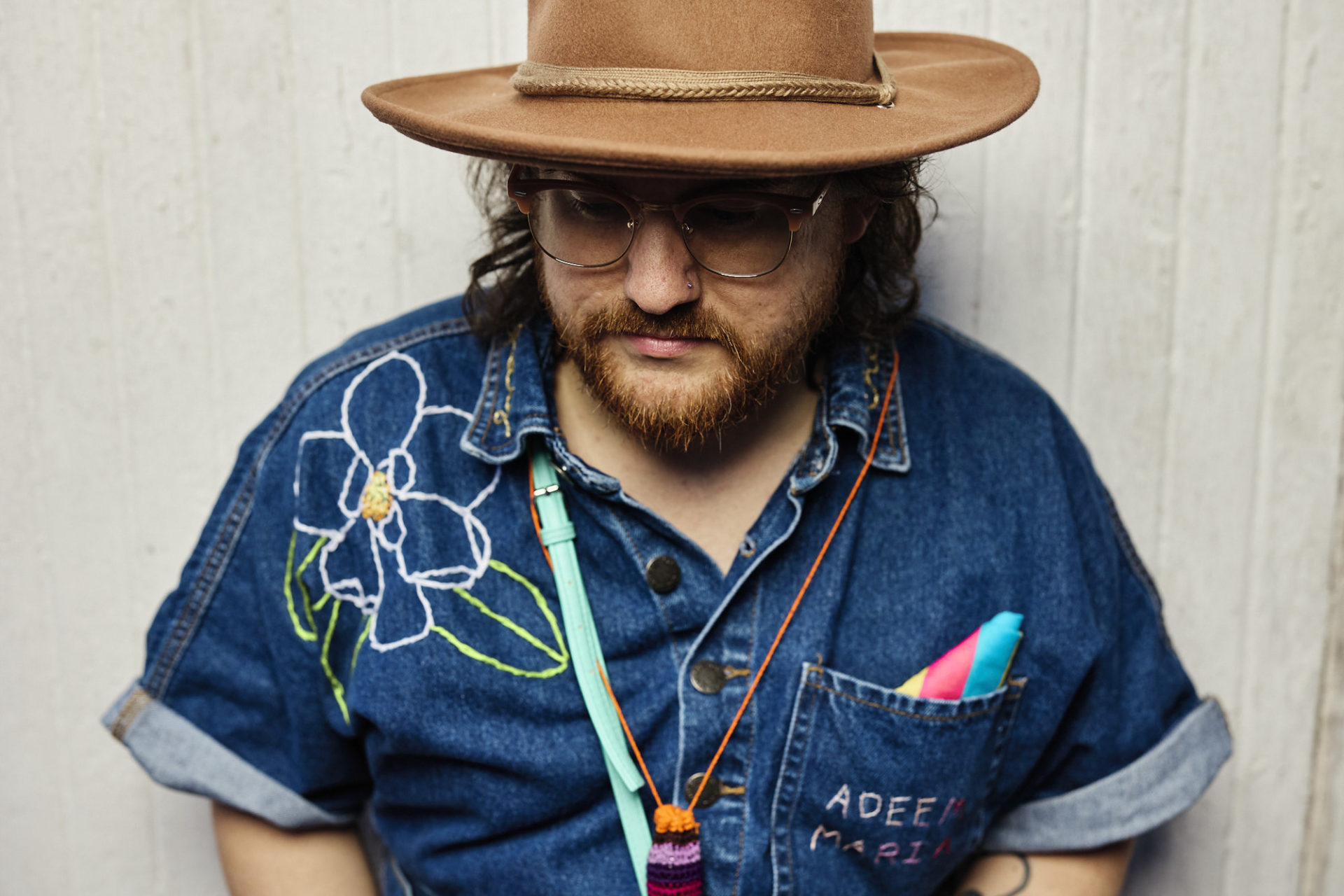When I connected with Adeem the Artist to discuss their striking new album, White Trash Revelry, and their upcoming appearance this weekend at the Champaign-Urbana Folk & Roots Festival, our conversation touched upon the traditional values that often dominate the country music scene in Nashville. Adeem, who identifies as non-binary, shared their candid perspective on the need for broader inclusivity in country music. Their insights highlighted a desire for a more expansive representation of artists in this cultural space.
Adeem eloquently delineated country music as a tradition from the Country Music Industrial Complex controlling radio play and award shows. They explained, “There’s country music, the tradition of which Americana is kind of part and parcel to, right? It’s continuing that same tradition of root songwriting and the Psalms of laborers.” This distinction is important to Adeem, because the music is what they were raised with, and still love with all their heart. The institution, on the other hand, hasn’t loved them back.
Adeem declared, “The Country Music institution, which has since inception, been a tool of homogenization and colonization that continues to be that way now.” This powerful claim encapsulates their disdain for an establishment clinging desperately to the status quo. An establishment representing the music and people Adeem grew up loving, and for better or worse, shaped who they are.
When I asked about their recent song “Run This Town,” a rousing honky-tonk number of their new album White Trash Revelry, that also happens to skewer performative activism in Nashville, Adeem expanded on their deep distrust of Music City’s liberal veneer. “As soon as you start to figure out the language that people are using to signify that they care about certain issues, cynical Nashville players quickly co-opt it for their own gain.” To Adeem, it rings hollow — empty rhetoric not matched by meaningful action.
Adeem touched on the trumped-up “culture war” narrative pitting conservatives against progressives in country music. But they argued it is a false equivalence, explaining, “There is a group of largely cis, straight white guys who believe that their perspectives and experiences should be at the center of everything that happens [in country music].” Adeem sees straight white men desperately clinging to maintain cultural dominance in country music, not two equally opposing sides vying for control.
Not many country artists embody the clash between embracing progressive values and pushing back against the genre’s entrenched bigotry more than Maren Morris. Adeem praised her courage, saying “Maren Morris is decrying” the hateful faction still dominating country radio and charts. Morris’ outspokenness recently led her to declare she can no longer be a part of country music under such oppressive conditions.
Adeem expressed camaraderie with Morris’ experience, sharing chilling firsthand encounters with country music’s dark underbelly. In one disturbing story, Adeem endured flagrant transphobic harassment from another artist at the Americana Honors and Awards show for wearing blue lipstick, just two weeks ago. Despite reporting it immediately to the organizers, “The members of the Americana Music Association made the decision to ignore the situation publicly,” Adeem said. Still raw from the painful experience, Adeem issued a four-page statement on their Instagram account shortly after the ceremonies, describing what happened without naming names, and sharing thoughts similar to what we discussed in this interview.

For Adeem, it confirmed ugly biases remain deeply embedded even among those claiming allyship in country music. “My experience of Americana is something similar,” they explained, comparing it to “liberal dudes” who believe their surface-level wokeness absolves them of further growth and nuance. Adeem feels Americana has “sincere and genuine” progressive intentions at its core. But true inclusivity requires constant vigilance, not just self-congratulation.
When I asked Adeem about their heritage as a southern artist, they doubled down on using their platform to agitate for change. They explained, “I think it comes with a responsibility. I think that doing this work and being in this sphere, demands that I advocate not just for myself, but for my community.” For Adeem, that means tackling themes like racism, homophobia, and trans rights head-on in songs like “For Judas.” They want to inspire “pathways for imagining a South that does less tangible harm to people.”
Adeem also discussed leveraging their media presence and awards show performances to send messages, like wearing the colonel outfit gifted to them by Tyler Childers at this year’s Americana Music Awards, where they were nominated for Best Emerging Artist. Adeem saw it as “communicat[ing] that I don’t think it’s right to pay lip service to a community while not giving them the opportunities.” It echoed Childers’ past critique of Americana’s claim as country music’s progressive alternative.
Yet their jabs at the establishment come from a profound place of love for what country music could be at its best. Adeem confessed that their initial discovery of the Americana scene “felt like this is the space where I would want to be honored,” they said. They remain hopeful more diverse, equitable gatekeepers can reshape corrupt institutions to open doors for marginalized artists.
But Adeem pulls no punches about the magnitude of challenges ahead. When I asked if they hold out hope for breaking barriers and changing minds in mainstream country music, they responded frankly: “The reality of that is just that I don’t hold a lot of hope for that genre or the institutions that uphold it. I mean, I think it’s [so] mired in corruption that it’s very difficult to even begin to break through.”
Nonetheless, Adeem stands boldly on that frontier, challenging the hate and bigotry poisoning country music’s riverbed, and doing it mostly with the art they create. Their music provides refuge for those abandoned by institutions that see their very existence as a threat. We should honor artists like Adeem the way they deserve: not despite their identities, but because of the profound truths flowing through their unbroken voices, and for their gifts as artists, documenting all of the good and bad in the world.

Midway through our expansive conversation, Adeem emphasized the need to honestly reckon with country music’s oppressive past to have hope for a more just future. They explained, “I think that a lot of people have a psychological mechanism that tries to prevent them from having to engage with the realities of systemic oppression, because of how disruptive it is to make the changes necessary to kind of play a role in helping write those wrongs and create a more equitable world.”
For Adeem, sugarcoating country music’s sins of the past makes it nearly impossible to move forward. “I think in life, we’re taught from a young age that our stories are ours and that it’s important that we get to write them and imagine what they are and that’s true,” they reflected. “But there’s also a whole bunch of stories that we just get dropped into when we’re born and there’s nothing we can do about it.”
They see America’s “history of racial violence” as one of those inescapable stories. “When you’re born in North America, you were just dropped into it… what your role is in that ongoing story is dictated by how you respond to the reality of that history,” Adeem explained. Avoidance and denial only prolong injustice.
This philosophy shines through in Adeem’s music as well. Their track “Heritage of Arrogance” offers “an unflinching look at growing up white in the South and grappling with those narratives of white supremacy.” But the song emerged from Adeem’s lived experience, not imaginary scenarios. As they told me, “Thomas Fight is the name of the fucking street I grew up on. I watched the Klan assembled in Charlotte, North Carolina. I saw Black people protesting on the opposite side of the street. [The lyrics] weren’t a collection of images I compiled to prove a point. It’s a retelling of my actual experience.”
By exposing country music’s history of racism, Adeem hopes to inspire action towards progress, not hand-wringing guilt. They explained, “The deconstruction of what it means to be in and of the American South means parsing through all of that and sometimes, really reimagining what it is about different aspects of southern culture, that cause real tangible long-term harm to people and which ones don’t.”

Despite the gargantuan task of altering the intents and actions of players within country music, Adeem has yet to abandon the fight. They espoused a “harm reduction” approach, trying earnestly to improve conditions for others even if rewards never come. As Adeem put it, “If I believe that it’s doing the right thing, if doing the just thing interferes with the financial stability of the career you’re doing, then the career you’re doing is not a good thing to be doing.” Their principles, not prospective album sales, lead.
Adeem also emphasized country music’s spiritual dimension, saying “I take the clergy-like aspects of being a musician and being in this role pretty seriously.” They placed themselves in the “prophetic tradition of challenging the systems that oppress and harm people.” Their songs become sermons; each stage a pulpit.
Though the road ahead remains daunting, Adeem feels called to walk it. They stand in solidarity with Maren Morris, Linda Perry, Brandi Carlile, and all who insist country music must shed its oppressive trappings. The institutions may resist, but Adeem is unshakeable.
Ultimately Adeem creates from the heart, not chasing acclaim. Their music emerges from and reflects their truth, not commercial calculation. Let their melodies sow seeds of change. Let their lyrics fall like rain on dry, cracked soil. Something new waits patiently underground, ready to grow. Even the most stubborn soil can gradually yield surprising new growth.
Adeem the Artist at C-U Folk & Roots Festival
Workshop at the Cohen Building
136 W Main St
Urbana
Sa Oct 14th, 1:30 p.m.
Urbana Free Library, Busey Mills Reading Room
210 W Green St
Urbana
Sa Oct 14th 3:30 p.m.
Rose Bowl Tavern
106 N Race St
Urbana
Sa Oct 14th, 7 p.m.








